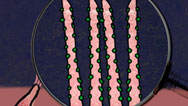Blocking Bitter Taste
- Posted 06.01.09
- NOVA scienceNOW
Some genetically modified mice can't sense bitter tastes like those found in broccoli and spinach. By studying these mice, researchers could find ways to make bitter foods and medicines more palatable to even the pickiest of eaters. Imagine a shaker of "de-bitterizing" crystals next to the salt and pepper.
Transcript
Blocking Bitter Taste
Posted: June 1, 2009
NEIL DEGRASSE TYSON: Some kids love to eat broccoli while others can't stand it.
CHILD: I don't like that green stuff. I don't want it.
NEIL DEGRASSE TYSON: How much do our genes determine what we like to eat? Can they turn otherwise good kids into picky eaters? If so, is there any way to help them? Bob Margolskee of the Mineral Chemical Census center and colleague John Glendinning at Barnard College are trying to find out—with the assistance of a few mice.
NEIL DEGRASSE TYSON: [Asking the researchers] Why are mice useful to you at all? Do they have the same tongue as we do?
JOHN GLENDINNING (Barnard College): Well it's much smaller. The physiology of the mouse's taste system is similar to ours in many respects.
NEIL DEGRASSE TYSON: [Narrating] In fact, when they gave this mouse bitter-tasting water, here's what he did.
NEIL DEGRASSE TYSON: [To the researchers] Okay he's right there; he's just licked it. And then pulled away immediately.
JOHN GLENDINNING: Oh he clearly didn't like it. And he's wiping his face off, and he squeaked.
NEIL DEGRASSE TYSON: And he got as far away as he could. He hid in the corner.
JOHN GLENDINNING: And he doesn't appear to have any interest in consuming it ever again.
NEIL DEGRASSE TYSON: Ever again.
NEIL DEGRASSE TYSON: [Narrating] But Bob has devised a way to change how a mouse perceives taste.
ROBERT MARGOLSKEE (Monell Chemical Senses Center): We've genetically engineered mice that are missing key genes in the taste cells.
NEIL DEGRASSE TYSON: [Narrating] Look what happens when this genetically engineered mouse approaches the same bitter water.
NEIL DEGRASSE TYSON: [To the researchers] He's just drinking.
ROBERT MARGOLSKEE: He really can't tell the difference between this bitter containing water, sugar sweet containing water or just plain water.
NEIL DEGRASSE TYSON: So to him it's just water?
JOHN GLENDINNING: It's just New York tap water.
NEIL DEGRASSE TYSON: [Narrating] Researchers are trying to find out more about how this gene works so they can find a way to temporarily turn it off. This could lead to new ways to block the bitter taste of medicine, especially ones made for kids, and that could make it a whole lot easier to swallow.
NEIL DEGRASSE TYSON: [To the researchers] For children who won't eat their vegetables, can you foresee a day when we just give them a pill that will suppress the bitter sensations in their palate, and then they'll just eat the broccoli and the greens?
ROBERT MARGOLSKEE: I think this is possible. If you can imagine kind of like a salt shaker except it would be an anti-bitter shaker. You take a plate of greens or a plate of broccoli, put this stuff on it.
NEIL DEGRASSE TYSON: It would be like a table condiment?
ROBERT MARGOLSKEE: Exactly. Any green vegetable is a combination of amino acids and salts and sweet carbohydrate and bitter. So the picky eater that's very sensitive to the bitter will reject it and will reject all that positive foodstuff because of the bitter taste.
NEIL DEGRASSE TYSON: Oh so if you suppress just the bitter piece of this –
ROBERT MARGOLSKEE: Just the bitter.
NEIL DEGRASSE TYSON: Then the rest of those flavors rise up –
ROBERT MARGOLSKEE: And will be appealing.
NEIL DEGRASSE TYSON: There you go.
Credits
- Produced for NOVA scienceNOW by
- Terri Randall
- Video
- (all) © WGBH Educational Foundation
Related Links
-

The Science of Picky Eaters
Don't like broccoli? Your DNA may explain why, because your sense of taste is largely encoded in your genes.
-

Tour the Tongue
Learn how our sense of taste works, and why we evolved the ability to detect flavors like bitter and sweet.
-

Picky Eaters: Expert Q&A
Geneticist Danielle Reed answers questions about taste, its genetic roots, and more.



